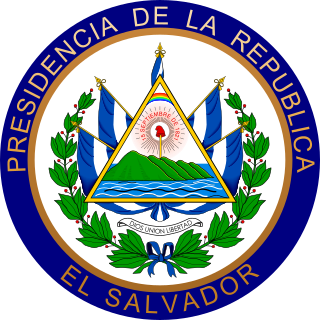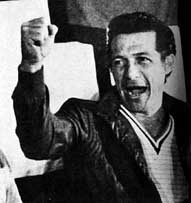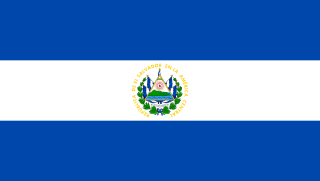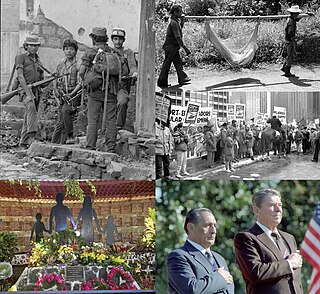This article needs additional citations for verification .(February 2024) |
| |||||
| Decades: | |||||
|---|---|---|---|---|---|
| See also: | |||||
The following lists events that happened in 1925 in El Salvador .
This article needs additional citations for verification .(February 2024) |
| |||||
| Decades: | |||||
|---|---|---|---|---|---|
| See also: | |||||
The following lists events that happened in 1925 in El Salvador .
The history of El Salvador begins with several distinct groups of Mesoamerican people, especially the Pipil, the Lenca and the Maya. In the early 16th century, the Spanish Empire conquered the territory, incorporating it into the Viceroyalty of New Spain ruled from Mexico City. In 1821, El Salvador achieved independence from Spain as part of the First Mexican Empire, only to further secede as part of the Federal Republic of Central America two years later. Upon the republic's independence in 1841, El Salvador became a sovereign state until forming a short-lived union with Honduras and Nicaragua called the Greater Republic of Central America, which lasted from 1895 to 1898.

The president of El Salvador, officially titled President of the Republic of El Salvador, is the head of state and head of government of El Salvador. He is also, by constitutional law, the commander-in-chief of the Armed Forces of El Salvador. The office was created in the Constitution of 1841. From 1821 until 1841, the head of state of El Salvador was styled simply as Head of State.

José Napoleón Duarte Fuentes was a Salvadoran politician who served as President of El Salvador from 1 June 1984 to 1 June 1989. He was mayor of San Salvador before running for president in 1972. He lost, but the election is widely viewed as fraudulent. Following a coup d'état in 1979, Duarte led the subsequent civil-military Junta from 1980 to 1982. He was then elected president in 1984, defeating ARENA party leader Roberto D'Aubuisson.

Roberto D'Aubuisson Arrieta was a Salvadoran military officer, neo-fascist politician, and death squad leader. In 1981, he co-founded and became the first leader of the far-right Nationalist Republican Alliance (ARENA) and served as president of the Legislative Assembly from 1982 to 1983. He was a presidential candidate for 1984 presidential election, losing in the second round to José Napoleón Duarte, the former president of the Revolutionary Government Junta. After ARENA's loss in the 1985 legislative elections, D'Aubuisson stepped down in favor of Alfredo Cristiani and was designated as the party's honorary president for life. D'Aubuisson was named by the United Nations' Truth Commission for El Salvador as having ordered the assassination of Óscar Romero, the archbishop of San Salvador in 1980.

The Revolutionary Government Junta was the name of three consecutive joint civilian-military dictatorships that ruled El Salvador between 15 October 1979 and 2 May 1982.

The Liberation Army of the South was a guerrilla force led for most of its existence by Emiliano Zapata that took part in the Mexican Revolution from 1911 to 1920. During that time, the Zapatistas fought against the national governments of Porfirio Díaz, Francisco Madero, Victoriano Huerta, and Venustiano Carranza. Their goal was rural land reform, specifically reclaiming communal lands stolen by hacendados in the period before the revolution. Although rarely active outside their base in Morelos, they allied with Pancho Villa to support the Conventionists against the Carrancistas. After Villa's defeat, the Zapatistas remained in open rebellion. It was only after Zapata's 1919 assassination and the overthrow of the Carranza government that Zapata's successor, Gildardo Magaña, negotiated peace with President Álvaro Obregón.
Álvaro Alfredo Magaña Borja was a Salvadoran lawyer, economist and politician who was the president of El Salvador from 1982 to 1984.

Francisco Menéndez Valdivieso was Provisional President of El Salvador from 22 June 1885 to 1 March 1887, then President of El Salvador from 1 March 1887 until his death on 22 June 1890.
Events in the year 1920 in Mexico.

The Salvadoran Civil War was a twelve-year period of civil war in El Salvador that was fought between the government of El Salvador and the Farabundo Martí National Liberation Front (FMLN), a coalition or "umbrella organization" of left-wing groups backed by the Cuban regime of Fidel Castro as well as the Soviet Union. A coup on 15 October 1979 followed by government killings of anti-coup protesters is widely seen as the start of civil war. The war did not formally end until after the collapse of the Soviet Union, when, on 16 January 1992 the Chapultepec Peace Accords were signed in Mexico City.

The current constitution of El Salvador was enacted in 1983 and amended in 2003. The 1983 constitution of El Salvador is similar to that of 1962, often incorporating verbatim passages from the earlier document. The constitution consists of 11 titles, subdivided into 274 articles.

Presidential elections were held in El Salvador on 4 March 1956. The result was a victory for José María Lemus of the Revolutionary Party of Democratic Unification, who received 95.2% of the vote.

Indirect presidential elections were held in El Salvador on 29 April 1982. The Legislative Assembly voted on three candidates nominated by the armed forces. Álvaro Alfredo Magaña Borja, leader of the Democratic Action, was elected by 36 votes to 17, ahead of the Nationalist Republican Alliance (ARENA) candidate.
Jaime Abdul Gutiérrez Avendaño was Salvadoran military officer and statesman. He was one of the leaders of the 1979 Salvadoran coup d'état which overthrew President General Carlos Humberto Romero and established the Revolutionary Government Junta (JRG), ending 48 years of exclusive military rule in the country. The coup started the 12-year-long Salvadoran Civil War which lasted until 1992.
Raúl Molina Martínez was one of three Vice President of El Salvador from 2 May 1982 to 1 June 1984, during the presidency of Álvaro Magaña. He was designed as the first vice president.
The following lists events that happened in 1924 in the United Mexican States.
Pablo Mauricio Alvergue Rovira is a former Vice President of El Salvador in the cabinet of Álvaro Magaña from 1982 to 1984.
Francisco José Guerrero Cienfuegos was a politician and lawyer from El Salvador who served as Vice President of El Salvador and President of the Legislative Assembly. He had a leadership position in National Conciliation Party (PCN).